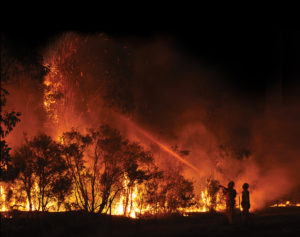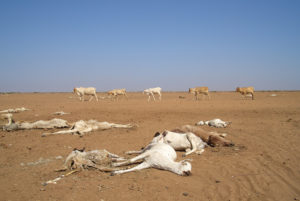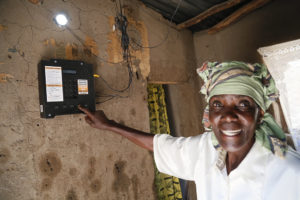The New “Roaring” Twenties
 Image: Quarrie Photography/Jeff Walsh
Image: Quarrie Photography/Jeff Walsh WELCOME TO THE NEW ROARING TWENTIES. The “roar” heard at the dawn of these 2020s isn’t the boisterousness and glitz for which last century’s twenties are remembered but rather the sound of the monstrous fires that have ravaged Australia, a country much like ours.
“The fire produced deafening, apocalyptic roars that will stay with me forever.” So wrote a survivor named Mary Frost in a collection of first-person accounts published January 8 in the New York Times. As 2019 ended and the new decade began, Frost sat on a small boat off Mallacoota with her sister, a puppy, and a few other people, driven onto the sea by a traumatizing nightmare she described like this:
The fire brought whipping winds, bursts of thunder, lightning strikes and, very briefly, rain. There was an eerie quiet, punctuated only by the anxiety-provoking but reassuring sound of sirens. There were gas blasts, houses toppling and trees crashing or exploding.
People are haunted not just by the roars they’ve heard but those they fear are coming. “This threat hangs over us constantly,” another of the Times’ Australian correspondents reported. “We obsessively scan the weather forecasts to work out which fire will suddenly roar down on us, annihilating everything in its path.”
Not long ago, a similar scenario played out in California, where fires transformed a town called Paradise into the exact opposite of its name. A roaring inferno bearing its own misleadingly pleasant name—the “Camp Fire”—killed eighty-six people in the fall of 2018 and destroyed 90 percent of the town, leaving tens of thousands of escapees homeless. A Paradise native with whom I’ve corresponded reports that the population has become a “diaspora,” spread out in other communities across the Sierra foothills, unlikely ever to return to Paradise.

Dead and dying animals in Kenya, which has experienced successive years of little rain. Evidence shows that global warming is increasing droughts, floods and climate uncertainty and unpredictability. Photo: Brendan Cox/Oxfam
Some culture observers say the just-concluded 2010s will go down as the decade the world woke up to the reality and threat of climate change. It would be more accurate to say the world was jolted awake, the way people are when an alarm clock is set to the loudest and most obnoxious tone and rips you from a sound sleep. The roar of a fire will do that.
If it’s true we’re awake, then it’s time to get busy in this new day. It’s time to get started on the urgent task of making our new Roaring Twenties the decade of action and responsibility.
A different understanding of wealth will be key. It’s here that we find telling parallels between Australia and the United States—two wealthy countries that have suffered devastating fires and that have national governments led by climate change deniers.
Selling coal to the world has fueled much of Australia’s economic success, and its Trumpian prime minister, Scott Morrison, insists that his country must continue mining and selling it. So Australia sends its carbon-rich coal out across the world, and the world sends back a deteriorating climate that is burning Australia and, via higher ocean temperatures, bleaching its famed coral reefs.
Seen through the smoke and flames, is that coal income worth the cost? If the fires become even more incessant and even more devastating—which is to be expected if the planet keeps getting hotter—when is there a tipping of the scales that convinces those of a Scott Morrison bent that something’s got to change?
That’s a question for this country, too. In the United States—a nation that has experienced floods and rain dumps of “biblical” proportions in addition to cataclysmic wildfires—the president refuses to enact policies to combat climate change and vows, à la Morrison, not to squander the wealth represented by the gas and oil under our ground. Never mind the damage, including harsh economic damage, the country and world will suffer if those resources are extracted and burned.
There is no wealth if there is no healthy, functioning planet. There is no vibrant economy if there is chaos and social breakdown brought on by floods and fires and temperatures so hot that it’s unsafe to go outside some days.

U.S. Coast Guard retrieves a canister dropped by parachute on sea ice melt ponds as part of a research mission on changing conditions in the Arctic . Photo: NASA/Kathryn Hansen.
One of the strange things about being alive and awake at the dawn of the new decade is the jarring disconnect between the normal and pleasant things many of us have in front of us at the moment—a job to go to each day, a decent place to live, lots of choices for food and entertainment and consumer products—and the specter of what the scientists tell us is likely to come: climate chaos unlike anything the supposedly civilized world has ever seen.
The tension between our contentment and dread is made more acute by optimistic commentaries that review the standard-of-living metrics and conclude, not unjustifiably, that things are better now than they’ve ever been. Be happy!
Case in point: a USA Today op-ed by the editor of the conservative website Ricochet.com assures us that things were “darn good” in the 2010s and are on track to get even better in the 2020s. Scientific-sounding organizations like the Global Warming Policy Forum that take money from the fossil fuel industry mock those who sound the alarm about climate change, claiming that these supposed doom mongers, not changes to our planet, are to blame for eco-anxiety. The polar bears will be fine! Then there’s Donald Trump, who keeps harping about how great things are under his administration, how much he’s doing for us, and how grateful we ought to be.
That’s not how life feels at the dawn of the new decade, especially if you’re young. The dread runs so deep through millennials’ psyches that some who might otherwise want kids are consciously choosing not to bring new humans into the world. Why would they want to subject them to what might lie ahead?
Stress and anxiety levels run high. While we applaud decreases in global poverty rates and child mortality, we see and hear (and, in the case of massive fires, smell) much that is going awry and falling apart. We witness an angry climate, the tearing down of our democratic system, the malign spread of calculated misinformation, and growing social hostility. Humanists face attacks on our values and equal status as secular citizens. Don’t try to gaslight us and tell us everything is great and bound to get better. There’s much that’s wrong, and it seems more than possible that it could get worse.
“Could” being the operative word. We have to ensure it doesn’t. There is still time. We must make this new decade the chapter in the story when humanists and other lovers of decency and democracy and flourishing rally to set society back on a healthier and more responsible course.
Remember when Newt Gingrich filmed a video with Nancy Pelosi calling for “cap and trade” and other actions to protect the climate? That was 2008—just before the collective insanity called “hyper-polarization” took hold.
It won’t be easy to institute low- and no-carbon ways of living, redefine wealth and the good life, and defeat the authoritarianism and religious-right political power plays that are on the ascent. But, flawed though we are, humans are capable of a lot.
If we want to be responsible stewards of a livable climate, we can walk and bicycle more and drive less. We can switch to electric vehicles, which, like much green tech, are becoming more affordable. We can make our homes more energy efficient and more of our meals plant-based. We can spread the message about climate solutions and energy-saving changes of habit via social media, letters to our community newspapers, and in everyday conversations. We can show up at demonstrations. (Go to AHA’s HERE for Climate website to find out more about sensible actions you can take.)

Government officials of the Republic of Maldives hold an underwater cabinet meeting to sign a document calling on all countries to cut their carbon emissions. Photo: Mohamed Seeneen
We can support political candidates at the local, state, and federal levels who are committed to making climate action a top priority. We can—we must—vote.
We can make the case for, and pressure our representative to enact, laws and policies that are needed to accelerate the transition to a green-energy society and economy. One obvious and potent measure, of course, is a carbon tax. Such a levy would ensure that the price of carbon-spewing products and services accounts for their “externalities”—their effects on the people and communities, or whole societies, that aren’t party to a given transaction but bear the brunt of its unintended consequences; i.e. climate degradation and its attendant maladies. This, in turn, changes the incentives and disincentives in the marketplace in ways that encourage governments, companies, and people to use less gas and oil and rely more on green energy. And that, as part of a virtuous cycle, motivates more research and investment in green-energy development, which we know is key to arresting the runaway train of climate change.
Many Republicans, believe it or not, used to support this market-oriented measure against carbon buildup. Remember when Newt Gingrich filmed a video with Nancy Pelosi calling for “cap and trade” and other actions to protect the climate? That was 2008—just before the collective insanity called “hyper-polarization” took hold of the GOP and led the party and its followers to view climate policy as a liberal crusade and, thus, something to be opposed at all cost.

A California farmer checks an underground micro irrigation system installed as part of a USDA incentives program to improve yields while reducing water use. Photo: Lance Cheung/USDA
At the gathering of economic elites in Davos, Switzerland, this winter, an initiative to plant a trillion trees generated wide support, even from Trump. Great. Plant the trees, please. But none of the Davos denizens should dislocate their shoulders by patting themselves on the back too vigorously. This is what’s known as doing the relatively easy stuff in hopes of being let off the hook for the more difficult and substantive work that needs to be done.
The carbon tax issue was also on the table in Davos. Suffice it to say this did not generate the same enthusiasm as the trillion-trees initiative. US Treasury Secretary Steven Mnuchin and others claimed that a carbon tax would land too hard on working people. (Who knew they cared so much about the working class?) They claimed it’s unnecessary because there’s enough technological innovation happening already to ensure the vitally needed drop in clean-energy costs.
Thankfully, not everyone at the Davos forum was satisfied with tree planting and wishful thinking. Swedish activist Greta Thunberg provoked Mnuchin with her insistence that the assembled corporate leaders heed the science and move with more alacrity to end carbon emissions. Britain’s Prince Charles joined her in pressing for a carbon tax, asking, “Do we want to go down in history as the people who did nothing to bring the world back from the brink?”
Good question.
Thankfully, Davos-style nonchalance does not prevail in all precincts. If you need sources of hope and encouragement, consider the changes that are happening at the turn of the decade. BlackRock, the world’s largest investments fund manager, has announced it is backing away from fossil fuels. Shell Oil is pivoting toward green energy (slowly, alas). New climate action alliances and campaigns are taking off, like the World War Zero initiative that is bringing together leaders from politics, the military, and the entertainment industry to hold ten million “climate conversations” in 2020 with citizens across the political spectrum.

A Tanzanian woman displays a solar lighting and electricity system she received from an international aid agency. Photo: Russell Watkins/Department for International Development
Young climate activists like Thunberg, Autumn Peltier, and members of the Sunrise movement challenge Baby Boomer and Gen X humanists to go further than they have to this point. If you’re reading this article, you’re probably on board with the proposition that climate change is real and we need to act. But there’s a generational difference around this issue. As the climate writer David Roberts points out, it’s one thing to assent to the reality and importance of climate change, as liberal Boomers and Gen Xers inevitably do. It’s another to do like Thunberg and her compatriots and absorb it, to swallow it all the way down and have it shape your worldview and life.
It’s this kind of all-in commitment that must catch on and “spread like wildfire” if the species is going to do what must be done in the new decade, lest we allow our new Roaring Twenties to climax in disaster like the Roaring Twenties of a century ago, only far worse.
